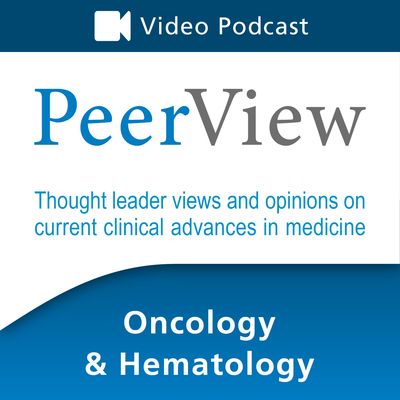PeerView (PVI) is a leading provider of high-quality, innovative continuing education (CME/CE/CPE and MOC) for clinicians and their interprofessional teams. Combining evidence-based medicine and instructional expertise, PeerView activities improve the knowledge, skills, and strategies that support clinical performance and patient outcomes. PeerView makes its educational programming and expert-led presentations and symposia available through its network of popular podcast channels to support specific specialties and conditions. Each episode includes a link to request CME/CE credit for participation. PeerView is solely responsible for the selection of topics, the preparation of editorial content, and the distribution of all materials it publishes.
http://ww2.peerview.com
Professor Peter Schmid, FRCP, MD, PhD - On the Cusp of the Era of Immuno-Oncology in Triple-Negative Breast Cancer: Rational Strategies to Make the Most of Immunotherapies and Other Effective Treatment Modalities Throughout the Disease Continuum
Go online to PeerView.com/PMD860 to view the activity, download slides and practice aids, and complete the post-test to earn credit. Tremendous advances have been made in the treatment of many other subtypes of breast cancer, but treatment of triple-negative breast cancer (TNBC) has remained challenging. However, recent developments suggest that we are on the brink of a new era in TNBC therapy that will bring the novel class of cancer immunotherapies to this population of patients. What is the most rational way and optimal setting to use cancer immunotherapies? How can we maximize their benefits so that more patients with TNBC would benefit from them? In this CME/MOC/CNE-accredited PeerView MasterClass on-demand activity, our expert panel discusses the biologic rationale for the use of cancer immunotherapies in breast cancer in general and TNBC specifically, as well as evolving evidence supporting the use of immune checkpoint inhibitors in advanced/metastatic and early-stage TNBC in neoadjuvant and adjuvant settings. Additionally, the panel focuses on patient/tumor evaluation and candidate selection for immunotherapies, using current and novel biomarkers to guide clinical decisions in early-stage and advanced disease, the importance of being aware of potential immune-related adverse events and how to diagnose/manage them, and the need for close collaboration among oncologists, breast surgeons, pathologists, and other professionals involved in the management of patients with breast cancer. Illustrative case studies and clinical scenarios discussed during the Practicum segment provide further guidance on best practices for the use and integration of immunotherapies into the treatment arsenal for patients with TNBC in real-world, clinical practice settings. Upon completion of this activity, participants will be able to: Describe the biologic rationale and rational strategies for harnessing the immune system in the treatment of triple-negative breast cancer (TNBC) specifically, and in breast cancer more broadly, including combinatorial or sequential approaches with immune checkpoint inhibitors and other effective therapies (eg, chemotherapies, other immunotherapies, PARP inhibitors and other targeted agents, surgery, radiation, etc) that may enhance immunogenicity and improve outcomes, Discuss biomarkers that may have utility in guiding and refining clinical decisions regarding the selection of appropriate candidates for immune-based and other therapies in TNBC, and the nuances of testing for these biomarkers in practice, Analyze efficacy, safety, and other key data from clinical trials assessing immunotherapy and immune-based combinations or sequential strategies with other effective treatment modalities throughout the continuum of TNBC, including metastatic, locally advanced, and early-stage resectable disease, Integrate immune checkpoint inhibitors and/or other effective treatment modalities into management plans of patients with TNBC based on the latest evidence, indications, recommendations, disease stage, patient and tumor characteristics, biomarker testing results, and patient needs/preferences
